Nearly two months ahead of the start of the 2016 Olympic Games, modernisation work at Rio de Janeiro–Antonio Carlos Jobim International Airport, known locally as RIOgaleão, has been completed. The 25 elevators, 21 escalators, 14 moving walks and 58 passenger boarding bridges supplied by thyssenkrupp will ensure quick and convenient transportation for over 17 million passengers who visit the airport every year.
The airport’s newly built Terminal 3 now houses a 100 metre long moving walkway, in addition to
June 23, 2016
Read time: 2 mins
Nearly two months ahead of the start of the 2016 Olympic Games, modernisation work at Rio de Janeiro–Antonio Carlos Jobim International Airport, known locally as RIOgaleão, has been completed. The 25 elevators, 21 escalators, 14 moving walks and 58 passenger boarding bridges supplied by 1894 thyssenkrupp will ensure quick and convenient transportation for over 17 million passengers who visit the airport every year.
The airport’s newly built Terminal 3 now houses a 100 metre long moving walkway, in addition to new passenger boarding bridges which use innovative safety technologies, featuring a European-standard automated docking system that allows precise measurement of gaps and minimises damage to the aircraft. This is particularly important when handling the world’s biggest passenger aircraft, the A380, as at least two bridges are needed per aircraft. RIOgaleão is the only airport in Brazil able to receive an aircraft of this size.
The positive effects of the airport’s modernisation are already having an effect; new airlines have added the airport to their schedules, while existing users such as Lufthansa are increasing the frequency of their flights to and from Rio.
The airport’s newly built Terminal 3 now houses a 100 metre long moving walkway, in addition to new passenger boarding bridges which use innovative safety technologies, featuring a European-standard automated docking system that allows precise measurement of gaps and minimises damage to the aircraft. This is particularly important when handling the world’s biggest passenger aircraft, the A380, as at least two bridges are needed per aircraft. RIOgaleão is the only airport in Brazil able to receive an aircraft of this size.
The positive effects of the airport’s modernisation are already having an effect; new airlines have added the airport to their schedules, while existing users such as Lufthansa are increasing the frequency of their flights to and from Rio.









